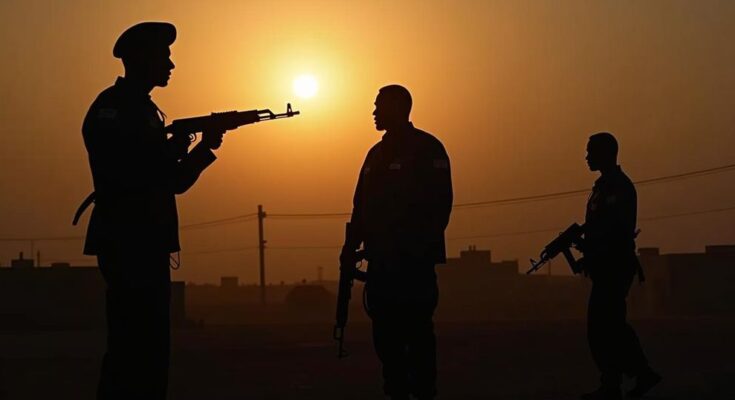Libya’s chief prosecutor has ordered the detention of militia leader Mohamed Bahroun for his part in the killing of human trafficker Abdel-Rahman Milad. Milad, previously sanctioned by the UN for trafficking, was shot in Tripoli. The events underscore the persistent issues of human trafficking in Libya and the complexities of international migration cooperation, particularly involving Italy. The situation reflects ongoing challenges faced by migrants and raises questions about the efficacy of current policies intended to combat trafficking.
Libya’s chief prosecutor has authorized the detention of militia leader Mohamed Bahroun and one of his aides following their involvement in the killing of notorious human trafficker Abdel-Rahman Milad, known for his significant role in trafficking operations and recently sanctioned by the United Nations. Milad, referred to as ‘Bija,’ was fatally shot while seated in a vehicle in Tripoli, a city where he had previously been imprisoned on trafficking charges. Bahroun and his associate voluntarily surrendered after allegations regarding their participation in Milad’s murder emerged. Milad had previously commanded a coast guard unit in Zawiya and was implicated in alarming allegations of sinking migrant boats using firearms as reported by a UN security assessment in 2017. In 2019, he was arrested after being recognized during a meeting in Sicily involving Italian officials that addressed migration control from Libya. This meeting resulted from a contentious agreement established in 2017 between Italy’s interior minister and Libya’s government, which aimed to enhance cooperation against migration. As part of this agreement, Italy committed to supplying Libya with financial assistance and patrol boats to curb migrant crossings. Italian journalists Nancy Porsia and Nello Scavo highlighted the discrepancies in intelligence as Milad’s presence at the meeting raised suspicions that Italian authorities may have knowingly engaged with human traffickers within the Libyan coast guard. Despite his continued claims of innocence regarding trafficking connections, Milad was arrested in 2020 and subsequently released, only to be promoted within the military ranks. The EU has publicly urged Libyan authorities to hold accountable those implicated in human trafficking, with spokesperson Peter Stano affirming the importance of justice for victims like Milad, who was further sanctioned by the EU in 2018. Human rights organizations criticize the EU’s partnership with the Libyan coast guard, claiming it often risks leaving migrants vulnerable to armed groups and abuse in detention facilities. Anas El Gomati, the head of the Sadeq Institute, emphasized in a social media post that Milad had effectively transformed rescue operations into a system of extortion, where intercepted migrants faced forced payments for release from detention camps. Libya remains a critical transit point for those attempting to migrate from Africa and the Middle East to Europe, often risking perilous sea crossings. Recent incidents, such as a shipwreck off Tobruk that left 22 migrants missing, underscore the urgency and danger of the ongoing migration crisis. Just days prior, the Libyan coast guard intercepted a vessel carrying 64 hopeful migrants bound for Europe.
The topic of human trafficking in Libya is deeply intertwined with the country’s ongoing challenges related to governance, security, and migration. Libya serves as a significant stopping point for thousands of individuals from Africa and the Middle East who seek to reach Europe by crossing the Mediterranean Sea. Unfortunately, the chaos and instability in Libya have led to rampant human rights abuses, including human trafficking, where armed groups exploit vulnerable migrants. Figures like Abdel-Rahman Milad, implicated in these operations, exemplify the complexities of tackling human trafficking amid ongoing political turmoil. Additionally, international cooperation, particularly between Italy and Libya, exacerbates the situation, as funds intended to curb migration often enrich those engaged in trafficking rather than protect vulnerable populations. Milad’s case not only highlights the pervasive issues of human trafficking but also European involvement in Libya’s coastal strengths and weaknesses, garnering both criticism and calls for reform regarding international migration strategies.
The recent detention of militia leader Mohamed Bahroun in connection to the killing of notorious human trafficker Abdel-Rahman Milad sheds light on the complexities of human trafficking in Libya. This incident reiterates the pressing need for accountability among those involved in trafficking networks and highlights the broader issues surrounding migration policies between Europe and Libya. Critically, this dynamic presents a challenge wherein funds aimed at protecting migrants may inadvertently empower exploitative entities, underscoring the urgent need for a reevaluation of strategies employed to manage migration and human rights in the region.
Original Source: www.euronews.com




